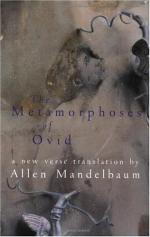|
|
Metamorphoses Author/Context
Ovid (Publius Ovidius Naso) was a Latin poet born in 43 B.C. in Sulmo, 100 miles east of Rome. In preparation for a career as a public servant, Ovid learned the craft of rhetoric from Arellius Fuscus and Porcius Latro, the most esteemed Roman rhetoricians of that time. Then he studied Philosophy in Athens before traveling around the eastern Mediterranean. When he returned to Rome, Ovid held several minor government offices before giving up that line of work to be a poet at approximately twenty years old, around the same time that Augustus began his reign. He joined the ranks of other Latin poets such as Tibullus, and Messalla, a statesman, was their patron. Ovid married three times, and his third wife was related to Paullus Fabius Maximus, a close friend of the emperor, Augustus.
Ovid's inspiration was found in the active bustle of Rome itself, and his work usually struck a chord with the younger, more sexually liberated of Roman society. Augustus disagreed with the increasing sexual liberation with which Ovid was identified because the emperor believed that it threatened the family and therefore society as well.
In roughly 16 B.C., Ovid published his Amores (Loves) and Ars amatoria (Art of Love) followed it 17 years later. This began the poet's fame, and by A.D. 8 Ovid was a prominent poet. But later that year, he was exiled to the remote town of Tomis. Although the reasons for his banishment are uncertain, there is speculation that Ovid was exiled because Augustus disapproved of Ovid's Ars amatoria combined with Ovid's alleged role as an accomplice in the adultery of Augustus' granddaughter. These theories are based on Ovid's description of his offenses as a "poem" and an "indiscretion" added to the knowledge that she was exiled that same year for adultery.
Ovid's major work, Metamorphoses, was completed before he was exiled. This epic poem is written in hexameter, unlike his other works. The poem also creates an epic that centers on mortal characters rather than heroes or the gods. Ovid even goes so far as to portray the gods as self-absorbed and vengeful in the many stories that Metamorphoses relates.
"Ovid, far more than any other ancient poet, was the model of the European Renaissance and the English Elizabethan and Jacobean ages: the translation of the Metamorphoses by Arthur Golding (1565-67) made a decisive impact on Shakespeare's mind (Midsummer Night's Dream is in part inspired by Ovid's work)."
Ovid's other works include Heroides (Heroines), Medicamina Faciei Femineae (On Taking Care of a Woman's Face), Remedia Amoris (The Cures of Love), Fasti, Tristia (The Lamentations), and Epistulae ex Ponto (Letters from Pontus).
Ovid was very unhappy in his banishment, and neither Augustus, nor his successor, Tiberius, ever recalled the poet from exile. Ovid remained in Tomis until his death in A.D. 17.
Bibliography
"Ovid." Ancient Greece and Rome: An Encyclopedia for Students. Vol. 3. Carroll Moulton, Editor. New York: Charles Scribner & Sons, 1998.
"Ovid." Greek and Latin Authors 800 B.C. - A.D. 1000. Michael Grant. New York: The H.W. Wilson Company, 1980.
Ovid. Metamorphoses. Trans. A.D. Melville. New York: Oxford University Press, 1986.




